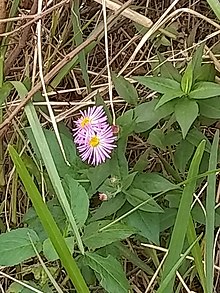Symphyotrichum elliottii (formerly Aster elliottii) is a species of flowering plant in the family Asteraceae native to the southeastern United States Atlantic coastal plain where it grows in wetland areas. Commonly known as Elliott's aster, it is a perennial, herbaceous plant that may reach 6 to 20 decimeters (2 to 6+1⁄2 feet) tall. Its flowers have pink (sometimes lavender) ray florets and pale yellow, then pink, then brown disk florets.[3] NatureServe, as of July 2021[update], classified S. elliottii as Apparently Secure (G4) globally, and of conservation concern in North Carolina, South Carolina, and Virginia.[1]
| Symphyotrichum elliottii | |
|---|---|

| |
| Scientific classification | |
| Kingdom: | Plantae |
| Clade: | Tracheophytes |
| Clade: | Angiosperms |
| Clade: | Eudicots |
| Clade: | Asterids |
| Order: | Asterales |
| Family: | Asteraceae |
| Tribe: | Astereae |
| Subtribe: | Symphyotrichinae |
| Genus: | Symphyotrichum |
| Subgenus: | Symphyotrichum subg. Symphyotrichum |
| Section: | Symphyotrichum sect. Symphyotrichum |
| Species: | S. elliottii
|
| Binomial name | |
| Symphyotrichum elliottii | |

| |
| Native distribution by state[3] | |
| Synonyms[2] | |
| |

Citations
edit- ^ a b NatureServe 2021.
- ^ a b POWO 2019.
- ^ a b Brouillet et al. 2006.
References
edit- Brouillet, L.; Semple, J.C.; Allen, G.A.; Chambers, K.L.; Sundberg, S.D. (2006). "Symphyotrichum elliottii". In Flora of North America Editorial Committee (ed.). Flora of North America North of Mexico (FNA). Vol. 20. New York and Oxford: Oxford University Press. Retrieved 10 July 2021 – via eFloras.
- NatureServe (2 July 2021). "Symphyotrichum elliotii Elliott's Aster". explorer.natureserve.org. Arlington, Virginia. Retrieved 10 July 2021.
- POWO (2019). "Symphyotrichum elliottii (Torr. & A.Gray) G.L.Nesom". Plants of the World Online. Royal Botanic Gardens, Kew. Retrieved 10 July 2021.
